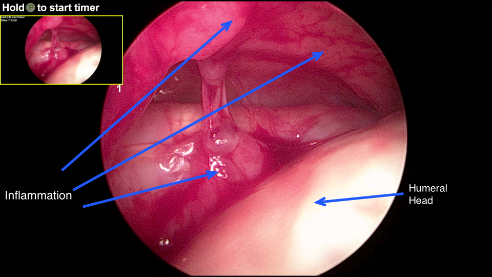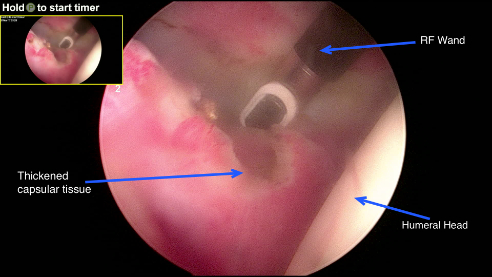Frozen / stiff shoulder
Frozen shoulder is a painful condition of the shoulder that results in stiffness and loss of movement of the joint; it is also known as adhesive capsulitis or contracted shoulder. The exact mechanism of why people develop frozen shoulder is unclear. Overall around 2-5% of the population will develop a frozen shoulder at some point. The condition is more common in in 40-60 year olds. It is seen more frequently in women and patients with diabetes, thyroid disease, hyperlipidaemia, and following heart attack or stroke. True frozen shoulder occurs without obvious cause, while stiff or contracted shoulders are seen after injuries, fractures, surgery and prolonged immobilisation.
What are the signs and symptoms?
The hallmark presentation of frozen shoulder is progressive, painful stiffening of the shoulder joint resulting in loss of movement both actively (movement initiated by the individual) and passively (movement performed by someone else). The condition classically progresses through three phases:- Freezing
Frozen shoulder develops spontaneously over time, and during the freezing phase the movements of the shoulder become painful and the joint starts to stiffen up. The capsule, or lining, of the joint becomes inflamed and painful, known as capsulitis. Typically this takes anywhere between six weeks and nine months.
- Frozen
The shoulder becomes stiff and is then classed as frozen. During this phase the pain generally diminishes while the stiffness remains. This period takes anywhere between four and 12 months. - Thawing
The shoulder “thaws” over a period of anywhere between five and 26 months, as movements start to return.
Overall, the average length of time for a frozen shoulder to develop and resolve is two and a half years, ranging from one to four years, with some people noticing some loss of movement at seven years from onset of symptoms. It is important to understand the natural history of the condition, which is resolution of symptoms with time, as this aids decision making for treatment options.
How is frozen shoulder diagnosed?
There is little to see in frozen shoulder, except for the complete loss of movement of the shoulder in all directions. Classically, there is loss of external, lateral or outward rotation of the joint. Any further assessment of the joint is prevented by loss of motion. An X-ray of shoulder is needed to rule out other shoulder pathology that can mimic a frozen shoulder, such as osteoarthritis or a locked shoulder dislocation. An MRI scan of the shoulder will not show any changes in the shoulder that will alter treatment and is therefore not necessary in the initial stages of frozen shoulder.How is it treated?
Frozen shoulders will eventually resolve with time, and treatment will depend on how the condition is affecting the patient. If patients are coping with the symptoms, intervention can be deferred, but if patients are not coping due to pain and stiffness then options can be discussed based on the timing of presentation. The options include:
Frozen shoulder inflamed capsule

Frozen shoulder release with radiofrequency wand
Physiotherapy
The role of physiotherapy is much-debated for frozen shoulder. Physiotherapy is an essential component of treatment post-intervention (injection, hydrodilatation or surgery). Physiotherapy should only be offered if pain is well controlled, as increasing pain with stretches can exacerbate the problem.
Steroid injection
A simple steroid injection can be placed into the shoulder joint to help settle the pain from the painful capsulitis of frozen shoulder. This can be particularly useful in the early painful freezing stage, but appears to have less of an effect if placed once the pain has resolved.
Hydrodilatation
Hydrodilatation, or hydrodistension, is a stretching injection performed under either ultrasound or X-ray guidance. Saline is injected into the shoulder under pressure in an attempt to stretch the capsule and allow movement. Local anaesthetic and steroid are also instilled to aid pain relief. Post-injection physiotherapy is essential in a combined approach to improve pain and range of movement of the joint. The exact mechanism of how this procedure works is not known, but the clinical results speak for themselves as a number of patients benefit from it. Hydrodilatation can be repeated if needed.
Surgery / arthroscopic capsular release
Keyhole surgery for frozen shoulder is performed as a day-case under general anaesthetic (asleep). The procedure removes the thickened, painful, contracted capsule that prevents shoulder movements. The surgery rapidly improves shoulder movement and reduces pain levels. Postoperative physiotherapy is crucial in the on-going treatment pathway and starts within a few days of surgery. It is also important to keep pain under control in the first few days to allow the shoulder to move.
What are the potential complications?
There is very little risk of infection from injections or hydrodilatation. Physiotherapy can exacerbate the problem in the early painful stage. The risks of surgery are low; there are very low risks of infection, bleeding, nerve injury and occasionally re-stiffening. The overall results are not significantly different between surgery and non-surgery treatments at two to three years following onset of symptoms, but clearly this is at the expense of pain, stiffness and loss of function of the shoulder. The concept of coping or not coping with symptoms should help guide patients in decision making for whether or not they decide to proceed with intervention: injections, hydrodilatation or surgery (keyhole release / arthroscopic capsular release).Testimonials
A big thank you to Simon and his team for their care, patience and perseverence looking after me through all stages of both shoulder and elbow surgery.
Since the shoulder stabilisation I have continued my sailing and fitness training without the worry that my shoulder might dislocate; and I don’t have to think twice whether my ulnar nerve will hinder any progression in my sports.
With their amazing help, I’ve been able to get back to sailing competatively and am now a double National champion.
After multiple shoulder dislocations Charlie helped me set a route for recovery, which has been nothing but smooth sailing. Surgery went successfully and I am well on my way to playing the sports I was previously. Would highly recommend.
Simon successfully operated on my frozen left shoulder in 2012 with fantastic results. This year he has overseen and advised treatment for my frozen right shoulder (via hydrodilation injection). His unrivalled experience in orthopaedic shoulder treatments, coupled with his reassuring bedside manner and excellent results, gave me huge confidence throughout. I’m hugely grateful to have my quality of life back and wouldn’t hesitate to recommend his services. Thank you Simon.
I had suffered with a painful shoulder and pins and needles for three years following a right shoulder fracture and failed half joint replacement prior to meeting Mr Pennington. He explained the situation in a way I could relate to and I’m delighted to say my revision shoulder replacement has gone well and for the first time in years I can use my arm and am pain free. I was even able to walk my daughter down the aisle 3 months after surgery! Many thanks.
I would like to thank Charlie Talbot and his team for the operations performed on both my shoulders and also the aftercare put in place after my operations. I have played golf since I was 12 years of age and thought at one point that I would never get back to playing again. Charlie was always very positive and told me that he would get me playing golf again. Well, I have now been playing golf for nearly 2 years. Before surgery I had a handicap of 12 and I am now down to 9, not bad at the age of 68. So many many thanks.
I had PRP injections into my right elbow last year and within 3 months I was pain free, a year on it is more or less 100% better. Fabulous I would recommend it to anyone with Tennis Elbow, in fact I have gone back again this year to get my left elbow done. Thanks Simon.
Mr Pennington I really wanted you to know how very thankful I am for the excellent care & treatment you and your staff gave me. It really meant a lot that you were so clear, friendly & professional and listened to me – so thank you again.
After more than four decades of shoulder problems with a total of three surgeries the full shoulder replacement surgery by Mr. Talbot has changed my life beyond expectations. I am now able bodied for the first time in years and pain free.
Thank you to Mr Boyle and team for the excellent care and attention both before and after Replacement Shoulder surgery, using the Tornier Simpliciti procedure. After very many months of severe pain and lack of movement I was pain free from day one. Now, after nine weeks, the shoulder and arm movement continues to improve, beyond expectation, with physiotherapy and exercise. I am extremely grateful for all the continuing care.
Following two years of recurrent problems with my left shoulder I was recommendedto Consult Mr Neil Pennington. I had the opportunity to have my surgery quickly and at my convenience, this fitted well around my professional and home commitments. The surgery was carried out as a day case procedure and Mr Pennington visited me following the surgery to explain everything. My operation was a minimally invasive procedure so my recovery was straightforward with only a few restrictions; in fact I was encouraged to keep my shoulder moving. I was driving and back to work after 2 weeks – after 2 years of pain and sleep disturbance I found this operation to be life changing! I found Mr Pennington to be a very professional and compassionate surgeon and he is surrounded by a whole team of professionals that gave me the utmost confidence in the care and treatment I received.
I would like to thank Mr. Talbot and the amazing team of nurses, physiotherapists and support staff for their care and support during my recent visit to the Duchy Hospital, Harrogate, for a replacement shoulder. The care and attention I received was unparalleled. The pain free movement I now have has changed my life.


